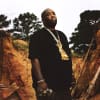Today the Supreme Court will hear the case of Anthony Elonis, a 28-year old man from Pennsylvania who has previously been found guilty of communicating threats of violence towards his estranged wife and an FBI officer in alleged rap lyrics posted on Facebook. The case will test whether the speaker's intent or the listener's response will determine if there has been a "true threat" of violence.
How do rap lyrics sound to the Court's aging jurists (Notorious RBG included)? Probably not as they do to the rest of us, suggests Killer Mike in an op-ed he co-authored with University of Richmond assistant professor Erik Neilson, for USA Today ahead of today's hearing. "Ignoring many of the elements that signal use of metaphor and hyperbole, prosecutors will present rap as literal autobiography," they write, arguing that rap lyrics alone should not be held as evidence of criminal behavior or considered a "true threat."
In addition to Elonis' case, they cite the incidents of Jordan Davis' murder over loud music, as well as the media's depictions of Michael Brown, as cases in which associations with rap music have been used to unfairly stereotype individuals. They conclude, "Trust us on this: The kids spending hours per day writing rap songs aren't a threat to society; they are often trying to escape the threats from society."
Read Killer Mike's Personal History on growing up while his own father was a police officer here.


